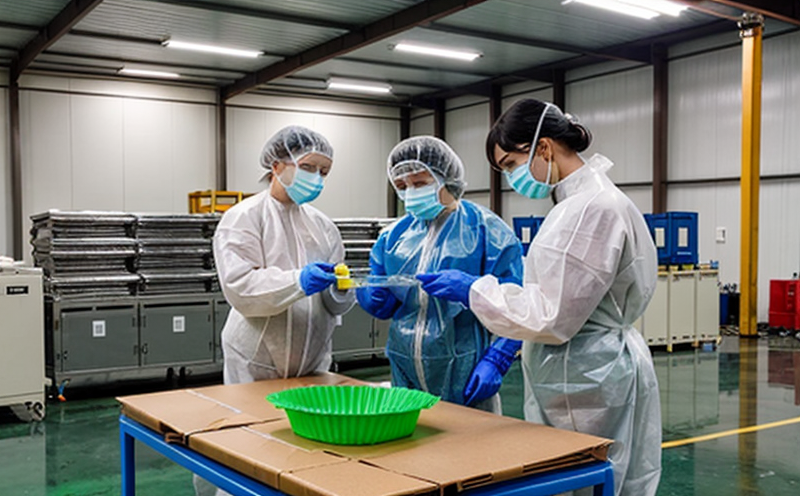ISO 178-4 Flexural Modulus of Sheets
The ISO 178-4 standard is a critical component in the evaluation of plastic packaging materials, particularly those used for sheets. This test measures flexural modulus, which is an essential property that indicates how much a material will bend before breaking under load. Understanding this characteristic helps ensure that packaging materials can withstand the stresses encountered during manufacturing, shipping, and handling without compromising structural integrity.
The test method requires precise specimen preparation according to ISO 178-4 guidelines. Typically, specimens are cut into rectangular prisms with a specific thickness (often between 2mm and 5mm) and length-to-width ratio. The choice of dimensions is crucial as it directly affects the outcome of the flexural modulus measurement.
During testing, the specimen is supported at both ends and subjected to a gradually increasing load applied perpendicular to its plane. The amount of deflection is measured with precision using a high-resolution displacement sensor. Compliance with ISO standards ensures that all measurements are accurate and comparable across different laboratories worldwide.
The results from this test play a vital role in quality control processes, ensuring that plastic packaging sheets meet the necessary rigidity requirements for their intended applications. For instance, sturdier materials may be required for food containers to prevent leaks or spills during transport, while more flexible options could be preferred for lightweight, portable products.
By incorporating ISO 178-4 flexural modulus testing into your quality assurance protocols, you can enhance product reliability and customer satisfaction. This test supports compliance with international regulations governing plastic packaging, thereby reducing the risk of non-conformity penalties or recalls.
The competitive landscape underscores the importance of accurate and reliable testing methods like ISO 178-4. In sectors where environmental sustainability is paramount, such as consumer goods and electronics, companies must demonstrate that their products meet stringent quality standards. This not only builds trust with consumers but also enhances brand reputation and market position.
- Increased Product Lifespan: Understanding the flexural modulus allows manufacturers to select materials capable of enduring harsh conditions without compromising performance.
- Better Resource Utilization: By optimizing material thickness, companies can reduce waste while maintaining robust packaging.
- Enhanced Compliance: Meeting international standards like ISO ensures adherence to legal requirements and fosters trust among regulatory bodies and consumers alike.
In conclusion, incorporating the ISO 178-4 flexural modulus test into your quality control practices offers numerous benefits. From improving product reliability to enhancing sustainability efforts, this method is an indispensable tool in ensuring high-quality plastic packaging materials.
Applied Standards
The ISO 178-4 test for flexural modulus of sheets aligns with several key international standards that govern the mechanical properties of plastics. These include:
- ISO 178:2019 - Plastics - Determination of Flexural Properties
- ASTM D790-18 - Standard Test Method for Flexure of Unrestrained Beam at Room Temperature
- EN ISO 178:2019 - Plastics - Determination of flexural properties (ambient temperature)
The aforementioned standards provide a robust framework for measuring the flexural modulus, ensuring consistency and accuracy across various testing scenarios. Compliance with these guidelines is essential for obtaining reliable results that meet industry expectations.
For quality managers and compliance officers responsible for ensuring product integrity, adherence to these standards is not only a best practice but also a legal requirement in many jurisdictions. By following the procedures outlined in ISO 178-4, you can guarantee that your testing methodology remains up-to-date with global industry trends.
Additionally, incorporating advanced technologies such as computerized loading systems and automated data analysis tools further enhances the precision of flexural modulus measurements. These innovations ensure that every test conducted adheres strictly to international standards, providing consistent and accurate results.
Customer Impact and Satisfaction
The ISO 178-4 flexural modulus of sheets testing plays a pivotal role in enhancing customer satisfaction by ensuring that plastic packaging meets the highest quality standards. By measuring this critical property, manufacturers can identify potential weaknesses in their materials early on, allowing for timely adjustments to improve product performance.
For quality managers and compliance officers, this test provides valuable insights into how changes in material composition or manufacturing processes affect the overall strength of the packaging sheets. This information is crucial when developing new products or modifying existing ones to meet evolving market demands.
In the realm of R&D engineers, ISO 178-4 testing offers a comprehensive understanding of different plastic types and their suitability for various applications. Engineers can use these results to innovate more durable, lightweight solutions that balance cost-effectiveness with performance requirements.
From a procurement standpoint, ensuring compliance with international standards like ISO 178-4 helps secure reliable suppliers who deliver consistently high-quality materials. This not only reduces supply chain risks but also fosters long-term relationships based on mutual trust and shared goals.
The real-world impact of this testing methodology extends beyond internal operations; it influences customer perception positively, leading to increased loyalty and repeat business. When customers know they are receiving products made from rigorously tested materials, they feel more confident in the safety and reliability of those goods.
Competitive Advantage and Market Impact
The competitive landscape is increasingly demanding as consumers seek eco-friendly alternatives while maintaining product quality. ISO 178-4 flexural modulus testing offers a clear advantage by providing comprehensive data on material performance under stress conditions, which can be leveraged to develop innovative packaging solutions.
- Enhanced Durability: By accurately assessing the flexural modulus, companies can design more resilient packaging that better withstands handling and transportation challenges.
- Innovative Solutions: Understanding how different materials behave under stress allows for the creation of novel packaging formats tailored to specific industry needs.
- Regulatory Compliance: Adherence to ISO standards ensures that products meet stringent environmental regulations, enhancing corporate social responsibility (CSR) credentials.
In terms of market impact, companies that invest in advanced testing methodologies like ISO 178-4 are better positioned to compete globally. They gain a deeper understanding of material properties and can respond more effectively to changing consumer preferences and regulatory requirements. This strategic approach not only strengthens their competitive position but also contributes positively to the overall sustainability goals within the industry.





